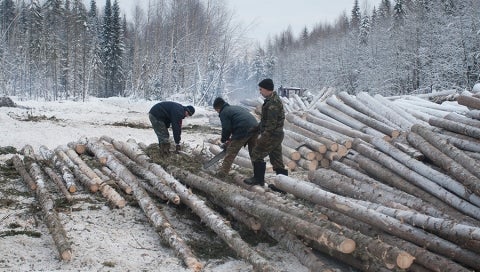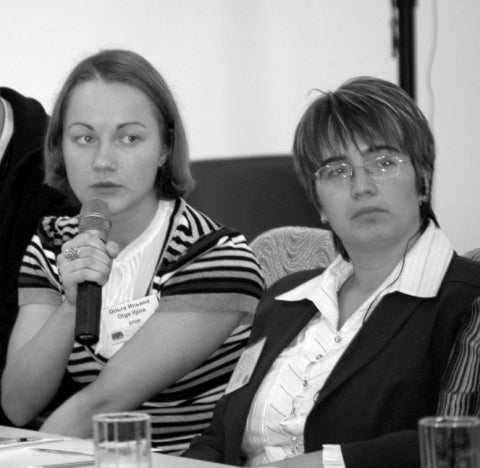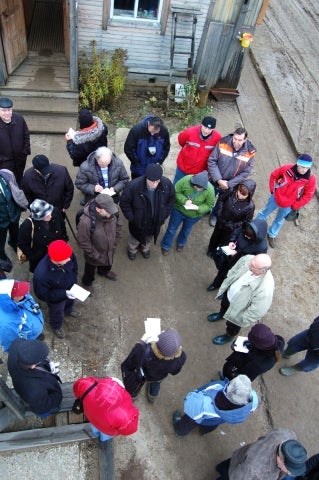Note: Yale School of the Environment (YSE) was formerly known as the Yale School of Forestry & Environmental Studies (F&ES). News articles and events posted prior to July 1, 2020 refer to the School's name at that time.
 Logging in the forests of Komi, Russia.
Logging in the forests of Komi, Russia.
In 2008, a Yale initiative that promotes dialogue between stakeholders on complex forest issues, ventured into a region in northwestern Russia known as the Komi Republic. In Komi, a region on the edge of Urals where fortunes are made on its forests and natural resources — often involving local communities — The Forests Dialogue convened its first meeting as part of an initiative to address forests and poverty reductions.
Created in 1998, The Forests Dialogue promotes ongoing, multi-stakeholder conversation and trust building to resolve forest-related conflicts across the world. Over nearly two decades The Forest Dialogue has convened more than 2,500 leaders to work through compelling, and often thorny, challenges.
Over the past 10 years, the Komi Dialogue has developed into an ongoing, multi-stakeholder platform that has served as a fruitful convening tool in the Russian region. First convened in 2008 as a field visit for The Forest Dialogue’s initiative on Forests and Poverty Reduction, the Komi Dialogue has now successfully gathered four subsequent dialogues with varying topics relating to forestry and local livelihoods.
The platform has been ushered along under the stewardship of two organizations — Silver Taiga and Mondi Syktyvkar — which represent two ends of the stakeholder spectrum in Komi. Rooted in the Komi Republic and other regions of the Russian Federation, the Silver Taiga Foundation focuses on promoting and supporting forest stakeholders through the development of sustainable forest management. Mondi Group, on the other hand, is an international packaging and paper group operating in over 30 countries. It aims to sustainably manage forests and purchase wood from responsible sources in order to produce pulp, paper and packaging goods. Together, the two entities have fostered a relationship of mutual benefit and trust, manifesting in continued support and exchange on local issues through the dialogue platform.
Created in 1998, The Forests Dialogue promotes ongoing, multi-stakeholder conversation and trust building to resolve forest-related conflicts across the world. Over nearly two decades The Forest Dialogue has convened more than 2,500 leaders to work through compelling, and often thorny, challenges.
Over the past 10 years, the Komi Dialogue has developed into an ongoing, multi-stakeholder platform that has served as a fruitful convening tool in the Russian region. First convened in 2008 as a field visit for The Forest Dialogue’s initiative on Forests and Poverty Reduction, the Komi Dialogue has now successfully gathered four subsequent dialogues with varying topics relating to forestry and local livelihoods.
The platform has been ushered along under the stewardship of two organizations — Silver Taiga and Mondi Syktyvkar — which represent two ends of the stakeholder spectrum in Komi. Rooted in the Komi Republic and other regions of the Russian Federation, the Silver Taiga Foundation focuses on promoting and supporting forest stakeholders through the development of sustainable forest management. Mondi Group, on the other hand, is an international packaging and paper group operating in over 30 countries. It aims to sustainably manage forests and purchase wood from responsible sources in order to produce pulp, paper and packaging goods. Together, the two entities have fostered a relationship of mutual benefit and trust, manifesting in continued support and exchange on local issues through the dialogue platform.
 Participants in the Komi Dialogue, held in the Republic of Komi, in 2008.
Participants in the Komi Dialogue, held in the Republic of Komi, in 2008.
The dialogue arose out of Mondi’s desire to experiment with a multi-stakeholder platform, which was very rare at the time in Komi. While Mondi had previously convened local stakeholders through their field offices, the centralization of their forest enterprise sparked a shift in their communication networks. Contact was now limited to the heads of municipalities responsible for huge swaths of land. Local people and Mondi alike realized the resulting gap and saw a growing need for bottom-up conversations around forest management planning, policies, and processes with all stakeholders connected to the land.
The 2008 Dialogue provided the first opportunity for local uptake of opinions and knowledge, participatory planning, and information sharing about Mondi’s future land use plans to be reinstated. It was clear throughout the 2008 Dialogue that commercial forestry already played a large role in sustaining some rural livelihoods in Komi. Forest leaseholders provided vital employment, tax revenue, and infrastructure development that were not readily available from other sources. Moreover, it became apparent that new models and approaches were necessary if forest industry and government were to make major improvements in rural livelihoods and address the key social issues surrounding forest use. This was not simply a question of changing company policies or amending Komi’s forest regulations. It required broadening the scope of local involvement in forest use planning, and increasing the capacity of villages to represent their interests in their relation to industry and government. The on-going platform has taken up this call to action and catalyzed real results for local stakeholders.
Ten years later, the platform convenes local participants representing forest industry, NGOs, community groups, indigenous organizations, government, and the private sector on a regular basis. By involving local people in forest-situated villages affected by forest management, the on-going dialogues have led to deeper and more targeted conversations for the Mondi paper-mill enterprise. Before these dialogues, stakeholders did not have regular conversations and subsequently most did not understand policies, agreements, and movements according to sustainable management. The dialogue platform has facilitated additional and more regular information sharing, with enhanced transparency and improved clarity. Furthermore, informal conversations with local communities who may not have been formally recognized as forestry stakeholders but do harbor special connections to the land — including hunters, fishers, and women’s groups — have increased. Between the dialogues that take place at an operative level, there are now also intensive consultations with local stakeholders. With this structure, there is room for both a higher-level forum and on the ground discussion, resulting in frequent progress checks and conversations about future steps.
The 2008 Dialogue provided the first opportunity for local uptake of opinions and knowledge, participatory planning, and information sharing about Mondi’s future land use plans to be reinstated. It was clear throughout the 2008 Dialogue that commercial forestry already played a large role in sustaining some rural livelihoods in Komi. Forest leaseholders provided vital employment, tax revenue, and infrastructure development that were not readily available from other sources. Moreover, it became apparent that new models and approaches were necessary if forest industry and government were to make major improvements in rural livelihoods and address the key social issues surrounding forest use. This was not simply a question of changing company policies or amending Komi’s forest regulations. It required broadening the scope of local involvement in forest use planning, and increasing the capacity of villages to represent their interests in their relation to industry and government. The on-going platform has taken up this call to action and catalyzed real results for local stakeholders.
Ten years later, the platform convenes local participants representing forest industry, NGOs, community groups, indigenous organizations, government, and the private sector on a regular basis. By involving local people in forest-situated villages affected by forest management, the on-going dialogues have led to deeper and more targeted conversations for the Mondi paper-mill enterprise. Before these dialogues, stakeholders did not have regular conversations and subsequently most did not understand policies, agreements, and movements according to sustainable management. The dialogue platform has facilitated additional and more regular information sharing, with enhanced transparency and improved clarity. Furthermore, informal conversations with local communities who may not have been formally recognized as forestry stakeholders but do harbor special connections to the land — including hunters, fishers, and women’s groups — have increased. Between the dialogues that take place at an operative level, there are now also intensive consultations with local stakeholders. With this structure, there is room for both a higher-level forum and on the ground discussion, resulting in frequent progress checks and conversations about future steps.
 Over the past decade, the Komi Dialogue has become a valuable tool for multiple-stakeholder discussions in the Russian region.
Over the past decade, the Komi Dialogue has become a valuable tool for multiple-stakeholder discussions in the Russian region.
A key example of tangible results born out of the multi-stakeholder platform, the establishment of consistent dialogue with local communities and forest management entities built a network that improved community relationships as well as local livelihoods. Mondi now works to prepare and incorporate management maps that indicate proposed operational sites, protected areas, and areas of social importance for circulation to local stakeholders. They solicit feedback from these plans and submit them to forest managers for input. Following a recent forest certification group meeting, Oksana Pomysova, head of the rural settlement of Spasorub, expressed her sense of encouragement by the meeting’s outcomes, which included “the Luzales management [corporation], experts and local residents involved.” Pomysova explained, “Each of the parties got a chance to speak out. The experts’ comments and estimates helped the local residents to understand that Luzales has to take their interests into account, while the company is to pay a closer attention to the requirements of the local community.”
Likewise, Mondi now has a social partnership agreement with local villages that have been impacted by logging operations. Through this arrangement, community members can apply for funding from Mondi to improve their livelihoods. To date, Mondi has awarded assemblages for developing local entrepreneurship, supporting social infrastructure, and developing education.
The most recent dialogue in Komi was convened last year to grapple with social inclusion challenges within forest management. Stakeholders discussed a breadth of issues, from insufficient awareness amongst local communities regarding forest operations; poor access by small local entrepreneurs to forest resources; the limited supply of firewood and sawn timber; conflicts with traditional non-timber uses of forests; and the impact of heavy timber trucks on public roads.
The Forest Dialogue’s initial dialogue in 2008 served as a catalyst for a sustained, multi-stakeholder engagement platform. Both Mondi and Silver Taiga have seen the importance of convening local stakeholders, who bring important perspectives to forest management discussions. The Forest Dialogue looks forward to seeing continued collaboration amongst stakeholders in a way that fosters further results for local livelihoods. For more information about the first Komi dialogue, please visit The Forests Dialogue or Silver Taiga.
Likewise, Mondi now has a social partnership agreement with local villages that have been impacted by logging operations. Through this arrangement, community members can apply for funding from Mondi to improve their livelihoods. To date, Mondi has awarded assemblages for developing local entrepreneurship, supporting social infrastructure, and developing education.
The most recent dialogue in Komi was convened last year to grapple with social inclusion challenges within forest management. Stakeholders discussed a breadth of issues, from insufficient awareness amongst local communities regarding forest operations; poor access by small local entrepreneurs to forest resources; the limited supply of firewood and sawn timber; conflicts with traditional non-timber uses of forests; and the impact of heavy timber trucks on public roads.
The Forest Dialogue’s initial dialogue in 2008 served as a catalyst for a sustained, multi-stakeholder engagement platform. Both Mondi and Silver Taiga have seen the importance of convening local stakeholders, who bring important perspectives to forest management discussions. The Forest Dialogue looks forward to seeing continued collaboration amongst stakeholders in a way that fosters further results for local livelihoods. For more information about the first Komi dialogue, please visit The Forests Dialogue or Silver Taiga.
Courtney Durham ’19 M.E.M., a second-year student at the Yale School of Forestry & Environmental Studies, is a former program associate with The Forests Dialogue.
Published
February 25, 2019